Atal Bihari Vajpayee only made friends, no enemies
Atal Bihari Vajpayee was both tender and tough. It was his ability to stay true to his values and also speak to all sections of society that mesmerised so many.
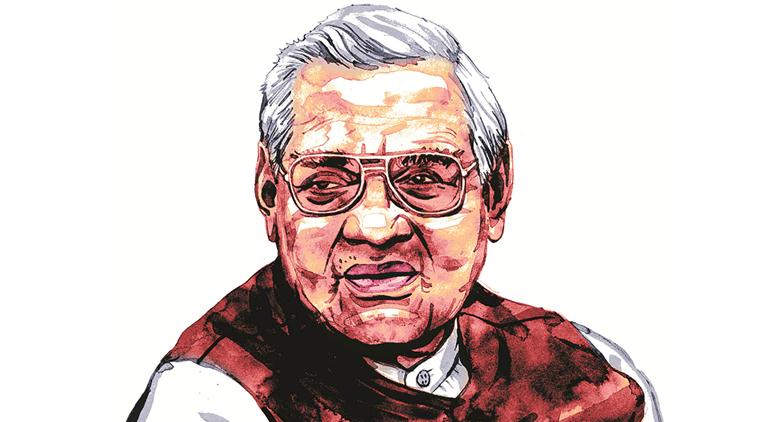
It is usually said that one’s ‘inner core’ is reflected on one’s face. Atal ji is a fine example of this maxim. (Illustration: CR Sasikumar)
Atal ji finally gave up and lost this one battle, as he set sail for new unseen horizons. This is a battle no one has won so far and Atal Bihari Vajpayee is no exception. But what makes him vastly different from others of his generation are the several battles that he had fought when he was alive by remaining “Atal” (unmoved) as far as his core values and convictions were concerned. He was both “Atal” and “Bihari” (a wanderer or dreamer) all through his life. He stayed rooted to his core beliefs even as he dreamt of a new India.
My first brush with Atal ji was in the late 1960s when I was going around Nellore city in a tonga announcing his visit. Little did I imagine at that time that I would one day be privileged to be the president of the party and sit between Vajpayee jiand Advani ji. Ever since, I have been fortunate to receive in great abundance the bounty of his love, affection, guidance and patronage. I deem it a rare honour that such a person of many virtues has guided me through my career.
It is usually said that one’s “inner core” is reflected on one’s face. Atal ji is a fine example of this maxim. His clarity of thought, strength of convictions, vision for the country and his idea of the inescapable course the nation needs to take to attain glory made him relaxed, even look detached, to the amazement of his peers. His constant smile, in my view, is a clear manifestation of Atal ji’s inner core.
Of his 65 years in active public life till 2009, Atal ji spent about 56 years in Opposition and only about nine years in power. He was elected to the Lok Sabha 10 times and twice to the Rajya Sabha. He was the Minister of External Affairs in the Morarji Desai government and later became prime minister thrice. But whether he was in Opposition or in office, Atal ji made seminal contributions to the growth and evolution of India since Independence.
The great orator that he was, Atal ji excelled as a public speaker and Parliamentarian, winning wide acclaim from across the political spectrum, including from Pandit Jawaharlal Nehru. One may say that it is easy to speak eloquently without the responsibility of office. But Atal ji addressed such doubts squarely as external affairs minister first and later, as prime minister of this vast country. He broke new ground, improving frosty relations with our neighbours and swiftly imparting a new perspective to our diplomacy, which won him wide acclaim. As prime minister, he demonstrated a remarkable understanding of the problems plaguing the nation and the ability to address the same.
He decisively demonstrated that he was not a mere orator, enjoying the liberty of the flights of imagination while in Opposition but a decisive leader when required to resolve the problems confronting the nation. He had won several battles both as an Opposition politician but even more as the prime minister.
As prime minister, Atal Bihari Vajpayee pioneered “Mission Connect India” by radically re-scripting the contours of various core sectors like telecom, infrastructure — including national highways, rural roads, airports and ports — private-sector participation and disinvestment. He proved to be a reformer par excellence, of which the nation is still reaping rich dividends. Atal ji added “jai vigyan” to Lal Bhahadur Shastri’s slogan of “jai jawan, jai kisan”, underscoring the sense of importance he accorded to knowledge in the contemporary times.
Vajpayee ji was a fine blend of tenderness and toughness. While the former trait was on show for long, the latter came out when the Pokhran-II nuclear tests were conducted and the way the aggressors were forced to retreat from the heights of Kargil. The tenderness of his personality was quite evident in the way he dealt with his peers across the political spectrum and in the manner he nurtured and led coalition governments at the Centre at a critical time.
Owing to his personal qualities, Vajpayee became the first non-Congress prime minister to complete a full term in office. He provided an alternate political thought and succeeded in providing a real alternative to the ruling party. He successfully led a coalition of 13 parties, proving that he was an able leader providing a stable government.
Vajpayee contributed to the Indian polity in multiple ways. He made a major contribution to strengthening democracy in the true spirit of the ideals enshrined in our Constitution. His name will go down in history as synonymous with and exemplary of the essence of good governance in the country.
Both the common man and the political class were won over by his charm, character and conduct. He was both the source and object of confidence of the people, which made him one of the tallest leaders of our county post Independence.
What made Vajpayee ji endearing to all the countrymen was the way he related to different sections of society. This was possible for him because he saw no contradiction in his commitment to the core values he believed in and in speaking for India as and when required. This was because he was and remained a true Indian, appealing to all Indians. He never compromised but he also never hesitated to speak his heart when a larger consensus needed to be articulated. This was Atal ji’s remarkable ability. In the process, he mesmerised and motivated millions like me to follow a true nationalist ideology. He was a national icon and a true “Ajatha Shatru”, one who had no enemies.
In our early days, we used to fondly call Atal ji “Tharuna Hriday Samrat”, a leader with a young heart. He remained so till illness struck him. That infectious smile stayed with him all through.
Bharat Ratna Shri Atal Bihari Vajpayee’s qualities of vyakthithva (personality), vaktruthva (oratory), karthruthva (devotion to duty), mithruthva (friendliness) all combined in nethruthva (leadership). They will be remembered for a long time to come. He was in the mould of a “philosopher-king”. A king who ruled the hearts of all Indians by his words and deeds. Such statesmen and visionaries walk on this earth but once in a while. Let’s resolve to carry forward his legacy as a true tribute to him.
The writer is Vice President of India
For all the latest Opinion News, download Indian Express App
More From M Venkaiah Naidu
- Swarajya to SurajyaTo build New India, today’s youth must look back at Bal Gangadhar Tilak and Chandra Shekhar Azad for inspiration...
- Lessons from dark timesRemembering Emergency: The people must stay at the forefront of protecting democracy...
- A new TRP philosophyRights and responsibilities must be harmonised for the sake of democracy. It would be appropriate for the media to dedicate itself to the promotion of…
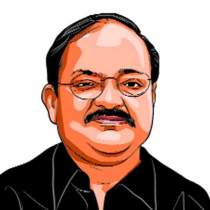
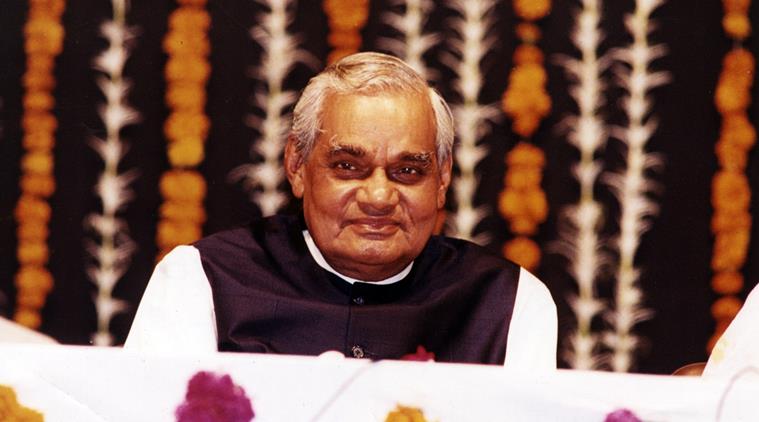 Atal Bihari Vajpayee dead: Prime Minister Atal Bihari Vajpayee’s health condition worsened yesterday and he was put on life support. He was declared dead at 5.05 pm today. (Express archive photo)
Atal Bihari Vajpayee dead: Prime Minister Atal Bihari Vajpayee’s health condition worsened yesterday and he was put on life support. He was declared dead at 5.05 pm today. (Express archive photo)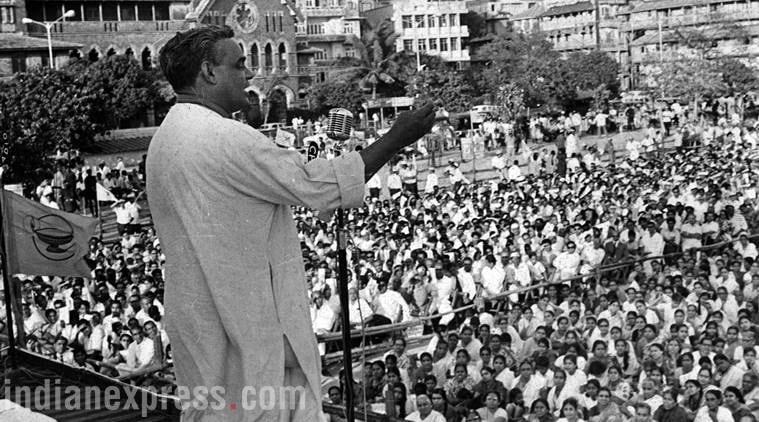 BJP leader Atal Bihari Vajpayee addressing a rally. Express archive photo
BJP leader Atal Bihari Vajpayee addressing a rally. Express archive photo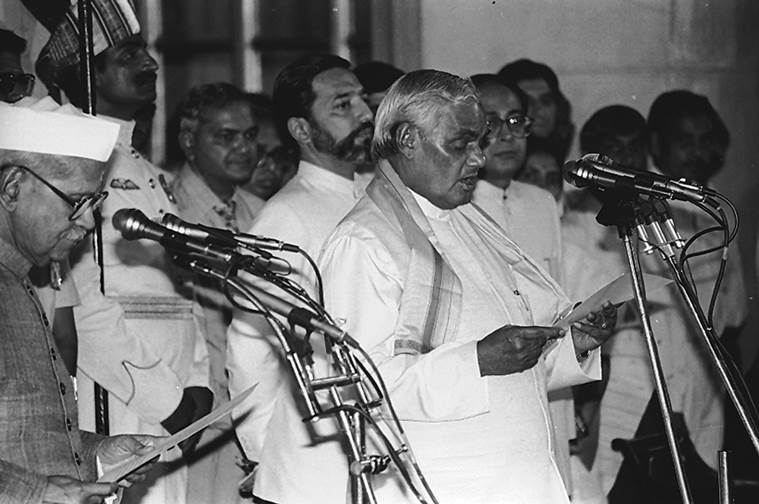 President Shankar Dayal Sharma administered the oath of office of the Prime Minister to Atal Bihari Vajpayee at the Rashtrapati Bhavan on May 16, 1996. (Express archive photo by Sunil Saxena)
President Shankar Dayal Sharma administered the oath of office of the Prime Minister to Atal Bihari Vajpayee at the Rashtrapati Bhavan on May 16, 1996. (Express archive photo by Sunil Saxena)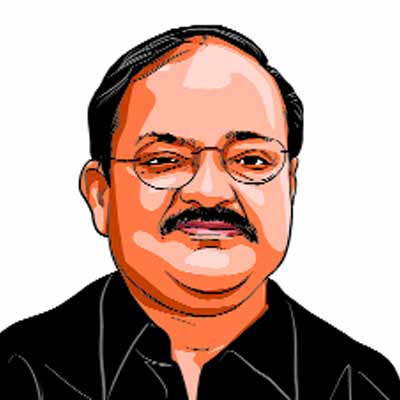






































No hay comentarios:
Publicar un comentario